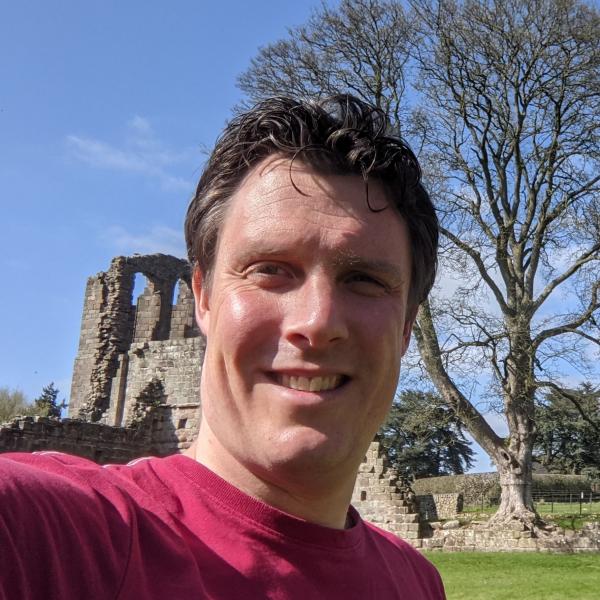Dr Phil Elks
BSc (Hons), PhD
Clinical Medicine, School of Medicine and Population Health
Senior Research Fellow


+44 114 222 3609
Full contact details
Clinical Medicine, School of Medicine and Population Health
Room F25
Firth Court
Western Bank
Sheffield
S10 2TN
- Profile
-
For enquiries, please contact – ClinMed-Operational@sheffield.ac.uk
I graduated with a BSc (hons) in Biochemistry at the University of Warwick in 2004. I moved to Sheffield for the first time in 2004 to pursue a PhD in bone biology in a collaborative project between the then newly forming, Centre for Developmental and Biomedical Genetics (CDBG) (with Dr Henry Roehl) and the Medical School (with Professor Peter Croucher), in which I studied the role of Wnt signalling in osteoblast formation in zebrafish.
After my PhD I did a post-doctoral project with Dr Stephen Renshaw, in which I investigated hypoxia-induced genetic signalling (HIF signalling) and its role in inflammation. During this project I developed the zebrafish as a model to study HIF signalling, and I was awarded a European Respiratory Society (ERS) Long Term Fellowship in 2011 to study HIF’s role in infection.
I moved to the University of Leiden, The Netherlands, to perform the ERS Fellowship, in which I found a role for HIF in the host-defence mechanism against Tuberculosis in a zebrafish model. In 2013 I was awarded a Vice-Chancellor’s Fellowship to return to Sheffield and set up my research group in Infection and Immunity.
In 2015 I was awarded a Sir Henry Dale Fellowship from The Wellcome Trust/Royal Society, which was extended in 2020.
- Research interests
-
When the body encounters invading pathogens, such as bacteria, a series of interactions between host immune cells and pathogen is initiated. These interactions are highly dynamic and involve complex genetic signalling pathways deriving from both the host and the pathogen. White blood cells, or leukocytes, of the host are able to phagocytose (internalise) bacteria and have an artillery of killing mechanisms to disarm the infection.
However some bacteria, such as Mycobacterium tuberculosis, have evolved to survive and proliferate within host immune cells, disarming the leukocytes to make a niche in which to prosper. These types of infection have been historically successfully treated by targeting the bacteria using antibiotics. However, more recently, there has been an alarming rise in strains which are multi-drug resistant. Further understanding of the host response to infection is required to identify genetic targets for much needed future host-targetted therapies.
One host-genetic pathway that I have previously identified as being a modulator of both inflammation and infection is the HIF pathway, an important cellular oxygen sensing pathway. In the normal oxygen situation the HIF transcription factor is silenced by protein degradation, however during inflammatory and infection situations HIF is stabilised in leukocytes, via mechanisms that have yet to be fully elucidated, and has a number of immune activating effects. HIF therefore represents a potential host-derived target for therapeutics against infectious disease.
The zebrafish is my chosen model to study the roles of HIF in host response to infection. The zebrafish embryo is transparent and genetically manipulable, allowing a unique opportunity in which to study the host response to infection in a whole organism setting. Utilizing zebrafish models of infection I hope to shed light on the roles of HIF during infection, and to further understand the complex signalling processes involved in host-pathogen interaction.
- Publications
-
Show: Featured publications All publications
Featured publications
Journal articles
- Mycobacteria counteract a TLR-mediated nitrosative defense mechanism in a zebrafish infection model. PLoS ONE, 9(6). View this article in WRRO


- Hypoxic signalling modulates neutrophil nitric oxide in a zebrafish tuberculosis model. EUROPEAN JOURNAL OF CLINICAL INVESTIGATION, 44, 12-12.


- Hypoxia inducible factor signaling modulates susceptibility to mycobacterial infection via a nitric oxide dependent mechanism.. PLoS Pathog, 9(12), e1003789. View this article in WRRO


- Hypoxia-inducible factor 2α regulates key neutrophil functions in humans, mice and zebrafish. Blood, 123(3), 366-376.


- A zebrafish model to study and therapeutically manipulate hypoxia signaling in tumorigenesis.. Cancer Res, 72(16), 4017-4027.


- The neutrophil's eye-view: Inference and visualisation of the chemoattractant field driving cell chemotaxis in vivo. PLoS ONE, 7(4). View this article in WRRO


- A method for the in vivo measurement of zebrafish tissue neutrophil lifespan.. ISRN Hematol, 2012, 915868. View this article in WRRO


- Drift-Diffusion Analysis of Neutrophil Migration during Inflammation Resolution in a Zebrafish Model.. Adv Hematol, 2012, 792163. View this article in WRRO


- Activation of hypoxia-inducible factor-1α (hif-1α) delays inflammation resolution by reducing neutrophil apoptosis and reverse migration in a zebrafish inflammation model. Blood, 118(3), 712-722.


- Tracking gene expression during zebrafish osteoblast differentiation.. Dev Dyn, 238(2), 459-466.


Chapters
- Measuring inflammatory cell migration in the zebrafish. (pp. 261-275).


Conference proceedings papers
- HYPOXIA-INDUCIBLE FACTOR 2 alpha REGULATES NEUTROPHILIC INFLAMMATION IN HUMANS, MICE AND ZEBRAFISH. THORAX, Vol. 67 (pp A1-A1)


All publications
Journal articles
- An arginase 2 promoter transgenic illuminates immune cell polarisation in zebrafish. Disease Models & Mechanisms, 16(6).


- Editorial: Neutrophil functions in host immunity, inflammation and tissue repair. Frontiers in Immunology, 12.


- Pioneer neutrophils release chromatin within in vivo swarms. eLife, 10.


- Guidelines for the use and interpretation of assays for monitoring autophagy (4th edition).. Autophagy, 1-382.


- Analysis tools to quantify dissemination of pathology in zebrafish larvae. Scientific Reports, 10(1). View this article in WRRO


- If it’s not one thing, HIF’s another : immunoregulation by hypoxia inducible factors in disease. The FEBS Journal. View this article in WRRO


- Polymersomes eradicating intracellular bacteria. ACS Nano. View this article in WRRO


- Semaphorin 3F signaling actively retains neutrophils at sites of inflammation. Journal of Clinical Investigation. View this article in WRRO


- Hypoxia induces macrophage tnfa expression via cyclooxygenase and prostaglandin E2 in vivo. Frontiers in Immunology, 10. View this article in WRRO


- The CXCL12/CXCR4 signaling axis retains neutrophils at inflammatory sites in zebrafish. Frontiers in Immunology, 10. View this article in WRRO


- Teleost contributions to the understanding of mycobacterial diseases. Developmental & Comparative Immunology, 96, 111-125. View this article in WRRO


- Hif-1α–Induced Expression of Il-1β Protects against Mycobacterial Infection in Zebrafish. The Journal of Immunology, 202(2), 494-502. View this article in WRRO


- Polarization of immune responses in fish: The ‘macrophages first’ point of view. Molecular Immunology, 69, 146-156.


- Expression of osterix Is Regulated by FGF and Wnt/β-Catenin Signalling during Osteoblast Differentiation. PLOS ONE, 10(12). View this article in WRRO


- Defining the phenotype of neutrophils following reverse migration in zebrafish. Journal of Leukocyte Biology, 98(6), 975-981.


- Exploring the HIFs, buts and maybes of hypoxia signalling in disease: lessons from zebrafish models. Disease Models & Mechanisms, 8(11), 1349-1360.


- Mycobacteria counteract a TLR-mediated nitrosative defense mechanism in a zebrafish infection model. PLoS ONE, 9(6). View this article in WRRO


- Hypoxic signalling modulates neutrophil nitric oxide in a zebrafish tuberculosis model. EUROPEAN JOURNAL OF CLINICAL INVESTIGATION, 44, 12-12.


- Hypoxia inducible factor signaling modulates susceptibility to mycobacterial infection via a nitric oxide dependent mechanism.. PLoS Pathog, 9(12), e1003789. View this article in WRRO


- Glucose metabolism impacts the spatiotemporal onset and magnitude of HSC induction in vivo. Blood, 121(13), 2483-2493.


- Hypoxia-inducible factor 2α regulates key neutrophil functions in humans, mice and zebrafish. Blood, 123(3), 366-376.


- A zebrafish model to study and therapeutically manipulate hypoxia signaling in tumorigenesis.. Cancer Res, 72(16), 4017-4027.


- The neutrophil's eye-view: Inference and visualisation of the chemoattractant field driving cell chemotaxis in vivo. PLoS ONE, 7(4). View this article in WRRO


- A method for the in vivo measurement of zebrafish tissue neutrophil lifespan.. ISRN Hematol, 2012, 915868. View this article in WRRO


- Drift-Diffusion Analysis of Neutrophil Migration during Inflammation Resolution in a Zebrafish Model.. Adv Hematol, 2012, 792163. View this article in WRRO


- Activation of hypoxia-inducible factor-1α (hif-1α) delays inflammation resolution by reducing neutrophil apoptosis and reverse migration in a zebrafish inflammation model. Blood, 118(3), 712-722.


- A Zebrafish Model Of Delayed Inflammation Resolution: Pharmacological And Genetic Activation Of The HIF1a Pathway. B36. AIRWAY IMMUNE MECHANISMS AND INFLAMMATION: ANIMAL MODELS.


- Tracking gene expression during zebrafish osteoblast differentiation. Developmental Dynamics, 238(3), spcone-spcone.


- Tracking gene expression during zebrafish osteoblast differentiation.. Dev Dyn, 238(2), 459-466.


- London calling: The 5th
UK Cellular Microbiology Network Meeting. Molecular Microbiology.

Chapters
- Fish Macrophages, Principles of Fish Immunology (pp. 203-227). Springer International Publishing


- Measuring inflammatory cell migration in the zebrafish. (pp. 261-275).


Conference proceedings papers
- Neutrophils activated with Hif-1 alpha are protective in zebrafish tuberculosis in vivo models. EUROPEAN JOURNAL OF CLINICAL INVESTIGATION, Vol. 49 (pp 67-68)


- Polymersomes for targeting and eradicating intracellular parasites. ABSTRACTS OF PAPERS OF THE AMERICAN CHEMICAL SOCIETY, Vol. 253


- Hypoxia signaling modulates neutrophil nitric oxide in a zebrafish tuberculosis model. EUROPEAN RESPIRATORY JOURNAL, Vol. 44


- HYPOXIA-INDUCIBLE FACTOR 2 alpha REGULATES NEUTROPHILIC INFLAMMATION IN HUMANS, MICE AND ZEBRAFISH. THORAX, Vol. 67 (pp A1-A1)


- HIF-2± Regulates Neutrophilic Inflammation In Humans, Mice And Zebrafish. C31. REGULATION OF LUNG INFLAMMATION


- FGF signalling is regulating bone development in zebrafish. MECHANISMS OF DEVELOPMENT, Vol. 126 (pp S209-S209)


- WNT signalling upregulates osteoblast differentiation in zebrafish: A novel model for studies in osteoblastogenesis. JOURNAL OF BONE AND MINERAL RESEARCH, Vol. 22(7) (pp 1115-1115)


Preprints
- Oncogenic RAS drives rapid onset cellular plasticity and elicits a tumour-promoting neutrophil response at the inception of preneoplastic development, Cold Spring Harbor Laboratory.


- Candida albicanssuppression of neutrophil reactive nitrogen species is rescued by host Hif-1αin vivo, Cold Spring Harbor Laboratory.


- Tribbles1 and Cop1 cooperate to protect the host during in vivo mycobacterial infection, Cold Spring Harbor Laboratory.


- An arginase 2 promoter transgenic illuminates anti-inflammatory signalling in zebrafish, Cold Spring Harbor Laboratory.


- Analysis tools to quantify dissemination of pathology in zebrafish larvae.


- The CXCL12/CXCR4 signalling axis retains neutrophils at inflammatory sites in zebrafish.


- Hif-1α stabilisation polarises macrophages via cyclooxygenase/prostaglandin E2 in vivo, Cold Spring Harbor Laboratory.


- Endogenous pioneer neutrophils release NETs during the swarming response in zebrafish, Cold Spring Harbor Laboratory.


- Mycophenolate mofetil increases susceptibility to opportunistic fungal infection independent of lymphocytes, Cold Spring Harbor Laboratory.


- Targeting mononuclear phagocytes for eradicating intracellular parasites, Cold Spring Harbor Laboratory.


- Mycobacteria counteract a TLR-mediated nitrosative defense mechanism in a zebrafish infection model. PLoS ONE, 9(6). View this article in WRRO
- Research group
-
- Amy Lewis - Research Assistant
- Ffion Hammond - PhD
- Jelle Oskam - PhD
- Tom Burgess - PhD
- Josh Norwood - PhD
- Ben Walker - Sheffield Hallam Placement Student
- Professional activities and memberships
-
- Vice-Chancellor’s Fellow.
- Member of the European Respiratory Society.
- Reviewer of manuscripts.
- Supervisor of students (BMedSci/ bachelors/ masters)
- Member of the Zebrafish Disease Models Society.
- NC3Rs Training Fellowship Assessment Panel (2021-2023).
